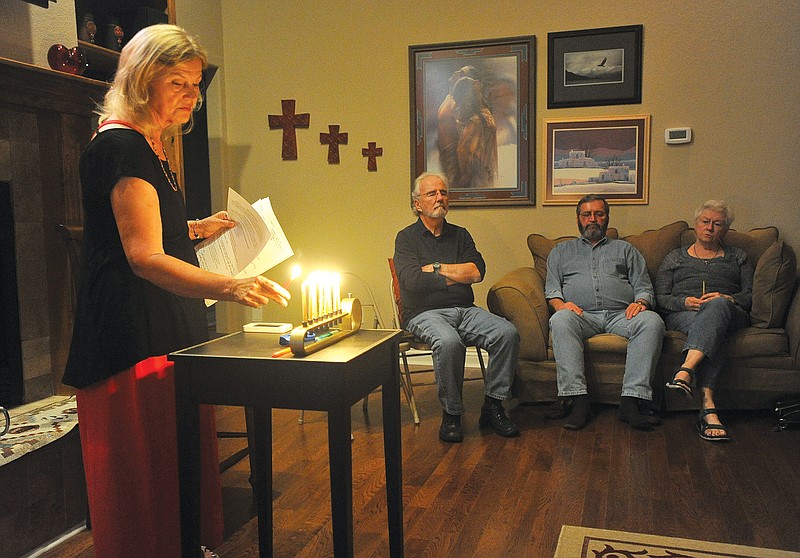I will see peace.
When I look into your eyes, I will see peace.
Go & Do
Taize Services
Nov. 15: 2:30 p.m., Terra Studios, 12103 Hazel Valley Road, Fayetteville
Dec. 12: 7 p.m., 1901 S. Pumpkin Ridge Drive, Fayetteville
Dec. 14: 10:30 a.m., Unity of Fayetteville, 4880 Wedington Drive
Information: [email protected], (832) 754-1791
When I look into your eyes, I will see peace.
I will see peace. I will see peace.
When I look into your eyes, I will see peace.
Annette Olsen softly sang the chant she wrote as about 10 others gathered for the opening of a local Taize service. The Rev. Dian Williams joined with harmony, swaying with the rhythm. The high ceiling and warm candles made the living room of Williams' home the perfect place for worship.
Another Taize Meditation for Peace is planned for 2:30 p.m. Nov. 15 at the Terra Studios Events Center. The Taize consists of an hour of music, meditation, prayer, chants, candle lighting and inspirational readings.
"The Taize (pronounced tay zay) service was conceived in the 1940s, during World War II, to provide a place of safety and sheltering for refugees fleeing the war," Williams told those who had gathered at her home. "People from all walks of life and all faiths and cultures were welcomed in Taize, France. The tradition continues to this day, throughout the world, blessing every person who feels the need for safety and connection."
Today, many seeking healing and peace visit Taize each year. "The Taize Community is made up of over a hundred brothers -- Catholics and from various Protestant backgrounds -- coming from around 30 nations," reads the Taize website. "By its very existence, the community is a 'parable of community' that wants its life to be a sign of reconciliation between divided Christians and between separated peoples."
Like the French monks, the Arkansas women -- including Kate Guendling -- want to offer a place for refuge, safety and peace. "They housed refugees during the war and never closed," Williams said. "It doesn't matter if there is a war on or not. There's always a need to be safe and at peace.
"I bring a huge desire and passion for people," Williams said. "I want to heal them. I think the sole purpose (of Taize) is to create a place for people to be when they need to heal their inner selves, so they can go out in the world and be strong."
"Sometimes the inner self needs to heal first, or we will crumple," Olsen said. "We all are tired and stressed out. We need healing from misinformation about ourselves, healing from the hurrying around to get so much done. So many people don't have time ... The healing service is for ourselves and others in different places in the world."
"I found the idea (of Taize) in Houston, in a Unity Church there," Williams explained. "I was looking for a tool to use in ministry outside the church walls. (The service is simple so) I can put it all in a little bag and take it on the road. There's little set up."
"It's exactly who we are and what we wanted to offer," Olsen said.
The history of the Taize drew Chrissie Black of Fayetteville to attend the first Taize. "It was done in World War II, and it was for anybody. That part intrigued me," she said. And the fact that Olsen was a friend prompted Black a little more.
Black attends the Unity of Fayetteville, where Olsen is the spiritual leader. "But it's a completely different format than Unity, and it has helped me spiritually grow."
"I was so touched and moved by the depth it took me," Black said, adding that she has seen others with tears in their eyes during various Taize services.
And she noted that, during a previous service at Terra Studios, guests to the studios would wander in without knowing about the service ... and stayed. "People don't leave. They stay," Black said.
"The Taize is profoundly moving," Williams said. "Each time we get a different mix of people and different energy." The upcoming service will be the fifth Taize in Northwest Arkansas.
"Some come from vastly different church backgrounds, and you might be sitting beside someone who has no religious background," Williams continued.
"Each one has a different take," with every individual choosing his extent of participation and his understanding, Black said. Taize even welcomes agnostic views, Olsen added.
"We wanted to create something that would bring people together in a spiritual setting," Williams said. "It's yours to run with."
Each Taize service is nondenominational, Williams said. "It's about people on a spiritual path. We all are at a different place -- we are different people."
But most of the readings and prayers at the local Taize service are based on the teachings of Jesus. "It is Christian," Olsen said. "But no one bangs a drum."
Rather, each service focuses on a different aspect of spirituality. The first three services considered love. September's topic was peace. And December's services address joy.
Olsen, Williams and Guendling pulled prayers from Hindu, Judaism, Buddhism, Islam, the Baha'i faith, Gaelic and Native American religions for the September service. A Menorah was used in the darkened room to light a candle for each faith, and guests were invited to share personal prayers.
"The Unity part of it teaches us to draw on the same kinds of sources," Olsen continued. "But they all are based on wholeness and presence of love."
The "oneness" of the service also spoke to Black. "We are all the same," she said. "There's no distinction. We all open our hearts."
Your prayer is my prayer, too. Your prayer is my prayer, too.
Whatever you feel, I feel, too. You're a part of me; I'm a part of you.
Your prayer is my prayer, too. Your prayer is my prayer, too.
-- Written by Karen Drucker
NAN Religion on 11/08/2014
